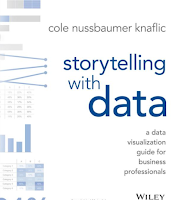Talk data to me
 Cheeky post title aside, one way I believe I add value at work is by asking about the numbers underlying the various initiatives I support.
Cheeky post title aside, one way I believe I add value at work is by asking about the numbers underlying the various initiatives I support.
For example, in my role assisting with HR communications and messaging, my colleagues sometimes come to me because they are getting "flooded" with calls from employees on a particular topic, and they want a plan of action. Before I make a recommendation, I usually ask them to quantify what they are saying: how many calls exactly? Over what period? How does that differ from the usual or expected volume?
Of course I stand ready to help, but the numbers they cite often indicate that it's better for us to listen attentively rather than communicate aggressively. They can keep answering questions, and being as helpful as possible. In the meantime, we can always prepare messages to issue more broadly if calls spike unexpectedly or are sustained over a long period.
Ask first, act later
Numbers give us perspective and often help shape our course of action if we know what to ask. In the above scenario, it's not just knowing "how many calls?" but also "over what period?" and "how does this compare with the normal volume?" that matter.
Numbers give us perspective and often help shape our course of action if we know what to ask. In the above scenario, it's not just knowing "how many calls?" but also "over what period?" and "how does this compare with the normal volume?" that matter.
We all need to ask similar questions to shape what we do next.
More broadly in HR, it's not enough to roll out excellent new programs; you must have goals around adoption, and around the results beyond that adoption. You need to be able to measure how you're doing against those goals. You need to have good conversations and challenge yourself and others as to what the numbers mean. That discussion will inform your next steps. More new programming? More promotion of the current programs? Changes to what you already rolled out?
More broadly in HR, it's not enough to roll out excellent new programs; you must have goals around adoption, and around the results beyond that adoption. You need to be able to measure how you're doing against those goals. You need to have good conversations and challenge yourself and others as to what the numbers mean. That discussion will inform your next steps. More new programming? More promotion of the current programs? Changes to what you already rolled out?
Let's get curious
It's a way of thinking we will need more of as the world of work moves faster and gets more complicated. I still find far too many smart people, experts in their domains, who lack basic curiosity about the measurable results of their work. It's an area I think most of us can develop, myself included.
Let's get (even) more curious about the numbers. In my case, I can focus on getting smarter about the questions to ask and the data that answer those questions.
There are so many resources to help develop this kind of thinking, including some popular blogs and books. I have a couple faves to share, and will blog about them in some future posts. In the meantime, I'd love to get any suggestions from you -- in comments or via a message.
Here's to our learning!
Photo by Alexander Sinn on Unsplash
It's a way of thinking we will need more of as the world of work moves faster and gets more complicated. I still find far too many smart people, experts in their domains, who lack basic curiosity about the measurable results of their work. It's an area I think most of us can develop, myself included.
Let's get (even) more curious about the numbers. In my case, I can focus on getting smarter about the questions to ask and the data that answer those questions.
There are so many resources to help develop this kind of thinking, including some popular blogs and books. I have a couple faves to share, and will blog about them in some future posts. In the meantime, I'd love to get any suggestions from you -- in comments or via a message.
Here's to our learning!
Photo by Alexander Sinn on Unsplash

Comments
Post a Comment